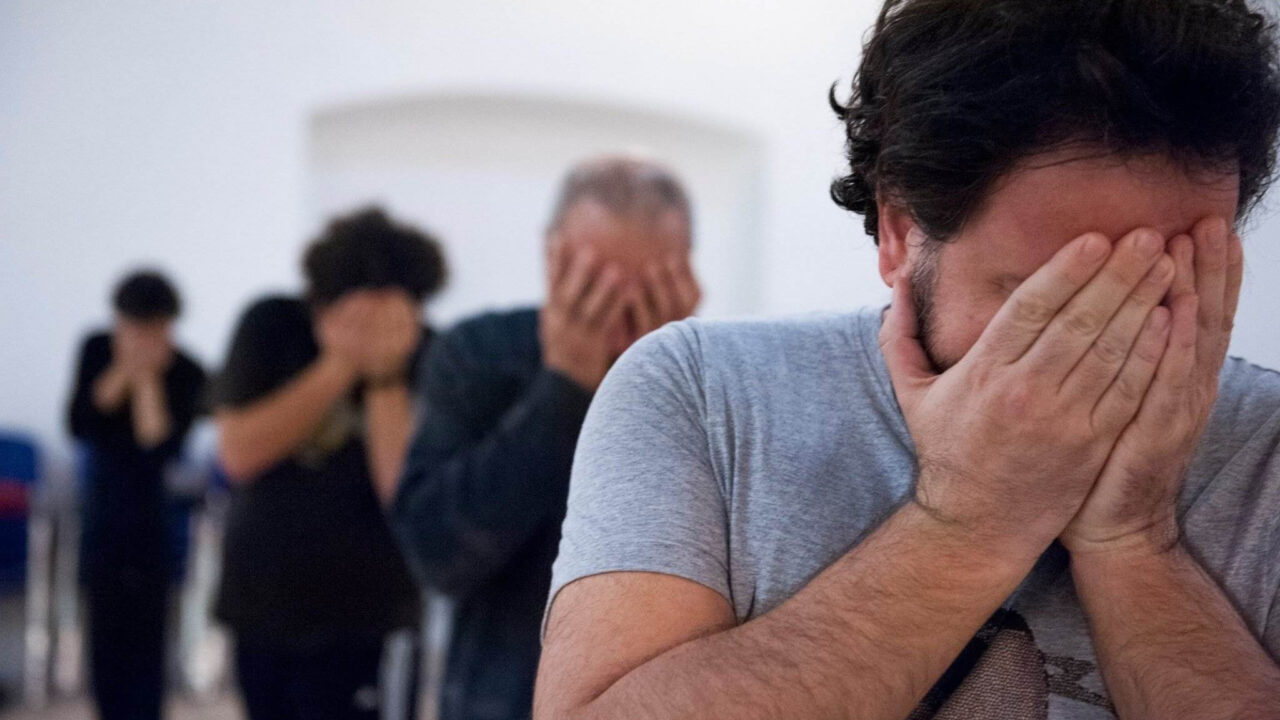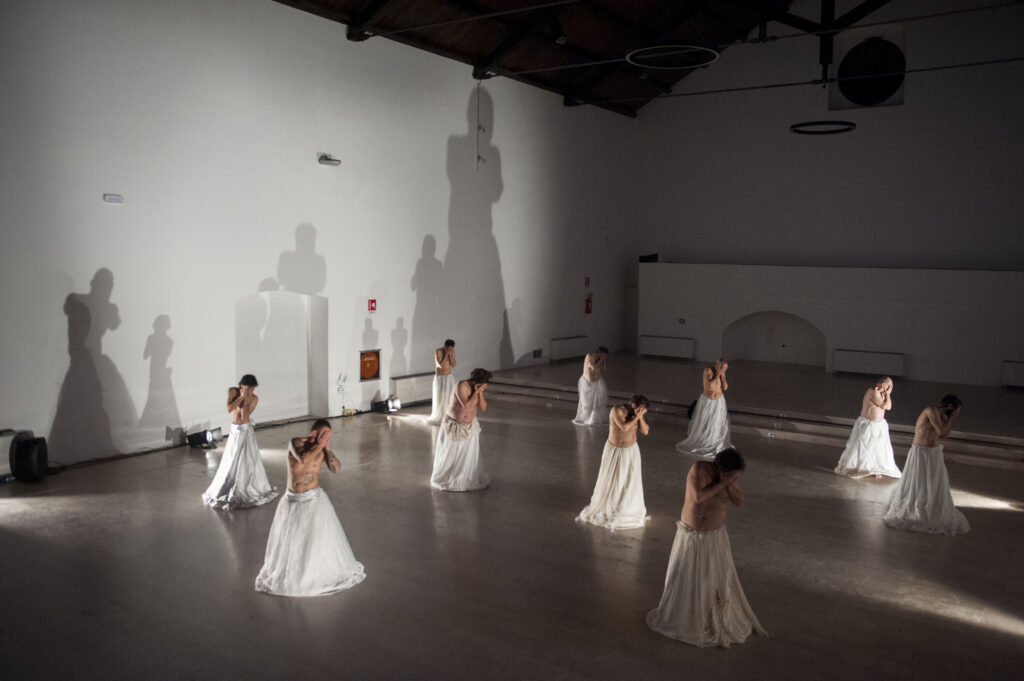Italy Turns to Theatre to Address Male Violence Against Women
Italian theater and cinema shine a spotlight on the root causes of gender-based violence, advocating for culture-wide solutions. Men enrolled in a week-long workshop centered around the story of Bluebeard in the town of San Vito dei Normanni, Puglia region, Italy. Archive photo by Martina Leo, courtesy of Io Ci Provo theatre company.
Men enrolled in a week-long workshop centered around the story of Bluebeard in the town of San Vito dei Normanni, Puglia region, Italy. Archive photo by Martina Leo, courtesy of Io Ci Provo theatre company.
PESCARA, ITALY — Each time Antonio Guadalupi goes onstage to perform “Bluebeard’s Brides,” inspired by the 17th-century French folktale Bluebeard by Charles Perraul, he feels the immense responsibility of being a male actor tasked with embodying a woman’s pain and anguish. “It is humbling work that requires both empathy and courage,” he says.
“Bluebeard” is the gruesome story of a wealthy businessman who murders his seven wives and hides their bodies in the basement of his house. In this dramatic reinterpretation of the classic story, Bluebeard’s seventh wife defies his orders not to snoop around their mansion and finds the remains of the other brides. In this updated version, Bluebeard’s dead wives come back to haunt him on his birthday and discuss the suffering inflicted upon them.
Wearing only a long white bridal skirt below his naked torso, Guadalupi walks slowly under the dim lights alongside six other men dressed in the same surreal outfit. To a backdrop of somber music, each gives voice to a woman’s story who has become a victim of gender-based violence in Italy. It is a dramatic performance that is meant to be a wake-up call for everyone in Italy, but especially for its men.
“This project has changed me,” says Guadalupi, a professional actor from Brindisi, a town in Southern Italy. “It has made me think about my own behaviors towards women, my way of thinking, and the words I use in daily conversations. It has forced me to work on myself not only as an actor, but also as a man in a society that perpetuates gender stereotypes.”
In Italy, a woman is murdered every three days, often at the hands of an intimate partner. In a report presented to the parliamentary commission on feminicide and gender-based violence on Jan. 23, Saverio Gazzelloni, executive director of the National Institute of Statistics, noted that 120 women were murdered in Italy in 2023. More than half of the homicides were perpetrated by a husband, partner or an ex-partner of the woman, while 20% were committed by other family members.
“If it is men who kill women — husbands, lovers, brothers and friends — then we need to work directly with men,” says Leone, who sees theater as a powerful instrument for social change.
Every time a woman is murdered by a man in Italy, her death is accompanied by a flood of data and statistics. It is rarely followed, however, by conversations about the root causes of such murders, or what can be done at the individual and collective level to address the perpetuation of a culture where masculinity is still defined by controlling and possessing women.
Bringing “Bluebeard’s Brides” to the stage is Paula Leone’s creative vision to build public awareness of these issues, one show at the time. Leone is the founder and executive director of Io Ci Provo, a theater company dedicated to promoting civil rights through the arts. She is one of a few female theater directors in Southern Italy, where misogynist attitudes are even more entrenched than in the north. She wanted a project that spoke directly to men and made them question their own belief systems.
“If it is men who kill women — husbands, lovers, brothers and friends — then we need to work directly with men,” says Leone, who sees theater as a powerful instrument for social change. “Theater can help people understand the true meaning of human rights and create new ways of relating to each other.”
The performance of “Bluebeard’s Brides” is a culmination of a weeklong workshop that connects men from all walks of life with a professional male actor. “I believe that dismantling patriarchy must start from within,” says Leone. While the framework of the play does not change with each performance, the monologues do, because they are written by the men enrolled in the workshop.
Co-creating these monologues is a transformative process for participants because they become conscious of how they relate to the women in their lives. “Violence stems from an abuse of power in gender relations. My contribution is to plant a seed in the conscience of actors and audience,” explains Leone. She hopes that seed sparks conversations and questions the status quo.

By moving us emotionally, the arts are capable of sparking long overdue conversations and even inspiring movements for social change. Think of the movie “Inconvenient Truth” by Al Gore that made people aware of the impact of the warming climate and the role that humans play in it. More recently, a film about Pakistani female-education activist Malala Yousafzai put the right to education on the global agenda and reminded the world of the barriers many girls face.
In November of 2023, not long after Giulia Cecchettin, a 22-year-old engineering student was stabbed to death by her ex-boyfriend, Paola Cortellesi’s comedy-drama “There’s Still Tomorrow” hit Italian movie theaters. The timing of this film, set in post-World War II Italy, could not have been more appropriate. Meant to be released at the onset of the annual worldwide campaign on 16 days of activism against gender-based violence, the film is centered around Delia, who is regularly beaten and abused by her husband, but retains her dignity and paves the way for her daughter to have a better future. It is a striking celebration of women’s empowerment in a patriarchal society that persists to this day.
Since Cecchetin’s murder, there have been 33 more homicides of women in Italy, many in a family setting, by a partner or an ex-partner. At his daughter’s funeral, Gino Cecchetin spoke about a culture that devalues the lives of women and urged men to become agents of change against gender-based violence. Italians have flocked to see Cortellesi’s movie, and the film is now being shown in schools across the country and used to start conversation about gender roles, social expectations and toxic masculinity.
The greatest challenge to lasting progress, according to Paladino and other women’s rights activists, is the lack of funding for initiatives that seek to dismantle the patriarchy from the bottom up.
“To change culture, we must start from culture itself,” says Lella Paladino, founder and vice president of Una Nessuna Centomila, an organization that supports women’s shelters across Italy and seeks to prevent violence against women by promoting a cultural shift through the arts and in schools. Education reform is something all politicians promise when a woman is killed, she says, but unfortunately it rarely happens.
The greatest challenge to lasting progress, according to Paladino and other women’s rights activists, is the lack of funding for initiatives that seek to dismantle the patriarchy from the bottom up. This includes performances like “Bluebeard’s Brides” and education initiatives in schools, for both students and educators, as well as gender-sensitive training for all those who interact with women impacted by violence: from police officers to social workers and medical professionals, all the way up to lawyers, judges and prosecutors.
“There are laws, but they are often not enforced. The gut of the country is stuck,” says Lella Paladino. “We have not had a radical change of culture necessary among those who apply the laws.” If those tasked to support women don’t understand this, she adds, they risk inflicting more violence and institutional harm, like separating mothers from children or not taking swift action against violent men.
Italian women’s rights activists look to neighboring Spain — a comparable country in terms of religion, size and culture — as a good example of legislative progress on violence against women and transformative actions. In 2004, Spain passed a comprehensive law against gender-based violence, years before the Council of Europe ratified the Istanbul Convention of 2011, which aimed to prevent and combat violence against women and domestic violence. Since then, Spain has established harsh penalties for offenders and launched training programs for health professionals and judges, as well as education campaigns in schools.
Progress in Italy, meanwhile, has been slow but steady. The Italian government approved a law on femicide only in August 2013, and one month later, ratified the Istanbul Convention. However, it took two years for the government to introduce national plans on violence against women. In 2019, the Codice Rosso, or “Code Red” law increased safeguards for victims, demanded harsher sentencing for offenders and required violent men to embark on a journey of self-reflection on the root causes of their behaviors. Listening centers for violent men are slowly emerging across the country, places where they are encouraged to embrace new models of masculinity and take responsibility for their actions. Though participation in these programs is voluntary, they are increasingly being mandated by local authorities.
Advocates have been saying for years that sexism must be tackled from an early age and all textbooks must be updated to promote gender equality and inclusion.
In November of last year, following Giulia Cecchetin’s murder, a new version of the Code Red law was passed unanimously by Italian lawmakers. This new iteration includes a mandate to roll out campaigns on “education to relationships” in public schools. Advocates have been saying for years that sexism must be tackled from an early age and all textbooks must be updated to promote gender equality and inclusion.
Monica Pasquino, from Scosse, a civil society organization that conducts gender trainings in schools, says she is not hopeful about the government’s will to implement broad education programs. “The work inside educational institutions cannot be done for free. It must be sustained [as] teachers change and new students enter the system,” says Pasquino, adding that Italy is one of the few countries in Europe that does not offer sex education in schools, let alone education on women’s rights and diversity.
In the absence of public funding for the arts and across-the-board public education programs, community-led initiatives like “Bluebeard” and Itinere, a listening center in Pescara, are planting seeds of change in the collective conscience of all Italians. But while Cortellesi’s film has accelerated the public discourse about art’s role in fighting violence against women, changing the culture is everyone’s responsibility — especially the men who perpetuate violence and a violent culture.
“It is not unusual for men to see themselves as the real victims of a situation,” says Luca Battaglia, director of Itinere. “Men must grow up emotionally and think about the stereotypes they carry within, or they risk being violent again. We are here to break that cycle.”
Your support matters…Independent journalism is under threat and overshadowed by heavily funded mainstream media.
You can help level the playing field. Become a member.
Your tax-deductible contribution keeps us digging beneath the headlines to give you thought-provoking, investigative reporting and analysis that unearths what's really happening- without compromise.
Give today to support our courageous, independent journalists.
You need to be a supporter to comment.
There are currently no responses to this article.
Be the first to respond.